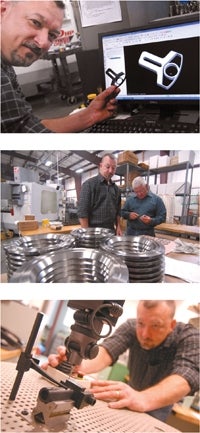Tinkering Around Is More Than A Hobby In Boylston
With business at his Boylston-based machine shop Phillips Precision Inc., slow-going last fall, the recession was forefront in Steve Phillips’ mind.
So ultimately, it became his muse.
The result: A variety of economical holding accessories for high-tech machines that measure and inspect precision-machined parts. Although this is nothing new for the market — such place-holding fixtures are ubiquitous and pivotal to the device inspection process — the difference is that Phillips’ line is lightweight, easily manipulated and crafted from plastic, aluminum and stainless steel, making it much simpler and less expensive than many other offerings.
So in the end, “It’s saving people money,” said Phillips.
Going To Market
Sold through The Pitbull Clamp Co. Inc. — Phillips Precision’s product selling arm — this “lean inspection work holding” product line as it’s called, is designed to complement inspection machines that determine accuracy.
The kit includes trademarked spring-action clamps of various shapes and functions, with names like “Trigger-Block” and “Cross-Bow,” (the latter resembling just that), with gripping edges that work like a trigger or spring to secure and release devices as they’re being inspected.
When a device is tested — which is a necessity when a particular part is being developed, tooled and eventually manufactured — the kit’s various clamps, stand-offs, rails, stops, and hold-downs are screwed into an aluminum tooling plate riddled with little holes, sort of like a Battleship game board. The fixtures are then shifted around to the user’s liking to hold the device delicately but securely in place, so that it can best be scanned and tested by the machine, and ultimately ensure it meets specifications according to the original blueprint.
As Phillips stressed, the pieces can complement each other and can be used in any configurations without the need for tools or tape. The kits are also modular, and can be customized, mixed and matched.
“They’re innovative, inexpensive, they work, and they really do increase productivity,” said Catherine Phillips, Steve’s wife and business partner.
The fact that the clamps increase productivity is key, according to Catherine, because whether a shop is large or small, the inspection area is often the place that leads to a bottleneck in work flow.
To prevent this, the trademarked grips and springs allow devices up for inspection to be swapped out and shifted with one hand. This inevitably can speed up the process, and, from a lean and green standpoint, can also reduce the amount of time that machines sit idle on the shop floor.
This is a particularly enticing point for customers.
The fixtures are “impeccable” and allow for a “much faster” manufacturing experience, according to a customer testimonial from Wayne Loomer, quality manager for Hologic Inc., in Marlborough.
Kevin Smith, project manager for the Massachusetts Manufacturers Extension Partnership, agreed, saying in his customer testimonial that the accessories put a “unique perspective on how products can assist a company to sustain lean (principles).” The clamps ultimately reduce waste, he said, and are economical.
Keeping It Local
Which leads back to Phillips’ main intentions. Because the inspections machines are so pricey — the average is around $20,000 — there’s a misconception that the place-holders and clamps required to go along with them have to be just as expensive, he said.
“It’s crazy to spend all that money and not get a lot,” Phillips said, describing other, high-priced items on the market as overkill.
The idea to develop his own line came out of a request from a customer who wanted custom fixtures to hold down a certain part. The tinkering simply continued from there.
Pitbull made and designed the prototypes. F&M Tool and Die in Leominster crafted the molds and all the parts were then manufactured locally.
Which is a key principle for Phillips.
“The ideas create jobs and stimulate the local economy,” he said. “We believe in having things made right here.”
It’s also a prime example of how smaller American shops are finding ways to thrive and innovate in the face of stiff competition from large overseas operations.
But in this product line’s case, the future is far beyond local markets.
Following the success of the company’s Pitbull Clamp — another innovative fixture clamp that is used by NASA and Rolls-Royce — the work-holding product line has been picked up by the distributor Mitee Bite, which is on board to sell it worldwide. The line will also be expanding soon, Phillips said.
“There’s a huge buzz around the product,” he said.
And, while he noted that there are many reasons for that, there’s one quality in particular that ascends the rest.
“It’s simple,” he said of the product. “This isn’t rocket science. The key to a good design is simplicity.”
Taryn Plumb is a freelance writer based in Worcester.










0 Comments